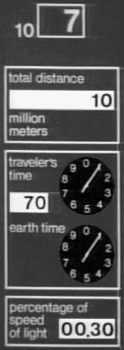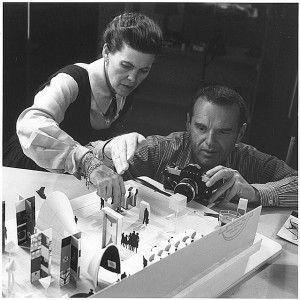As a follow-up to Shailesh Prasad’s thought provoking video (just below this article), I offer two equally impressive visualizations of the scope and magnificence of our universe. These videos are the epitome of a teachable moment. And it’s fun, too!
Check out this simple, one-button interactive Scale of the Universe by Cary Huang. Simply pull a slider left or right to zoom in or out. It covers the Universe from 1027 meters down to 10-35 meters (from the entire universe to the Plank length and quantum foam).
Charles and Ray EamesUnlike the classic film by Charles & Ray Eames (more about that later), the zoom doesn’t really take viewers closer or further away. Rather, it compares relative size by allowing users navigate by magnitudes (a circle indicates each power-of-ten).
Nikon, the camera and optics maker, created an alternate spin on this idea with more user control (identify and study objects used to illustrate size–and jump directly to any magnitude along the size continuum). Instead of panning in and out, the Nikon presentation crawls familiar objects along the horizontal axis. Interestingly, they end at modest lower limit of 10-15 meters, rather than attempting to illustrate quarks, charm and quantum foam.
 In 1968, Charles & Ray Eames were already famous as sculptors, architects and designers of modern furniture. That’s when they created Powers of 10, one of the most popular educational films of all time. Just 9 minutes long, it was intended as a “rough sketch” in an effort to attract an animation partner to add visual punch. 9 years after the original film was released, IBM collaborated with the designers and the film was re-released with improved special effects. Both versions are included on the commercial DVD. I prefer the original rough sketch.
In 1968, Charles & Ray Eames were already famous as sculptors, architects and designers of modern furniture. That’s when they created Powers of 10, one of the most popular educational films of all time. Just 9 minutes long, it was intended as a “rough sketch” in an effort to attract an animation partner to add visual punch. 9 years after the original film was released, IBM collaborated with the designers and the film was re-released with improved special effects. Both versions are included on the commercial DVD. I prefer the original rough sketch.

In the original film, two clocks sit outside the main frame. As we »
accelerate away from earth (covering 10X as much distance every ten seconds), the clocks track relative time from a traveler’s frame of reference –vs– a person on earth.
You can view the 1977 re-release (Be sure to raise quality to 480p). Interestingly, IBM has also posted a user-controlled, Zoomable version.
Philip Raymond is Co-Chair of The Cryptocurrency Standards
Association. This article originally appeared at A Wild Duck.
- Related: More about the films of Charles and Ray Eames at Snore & Guzzle

